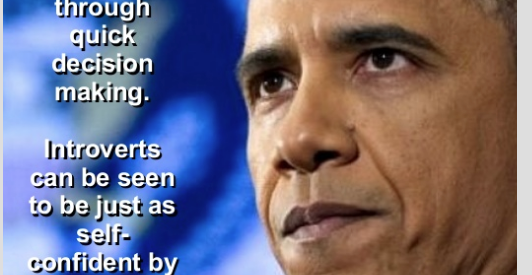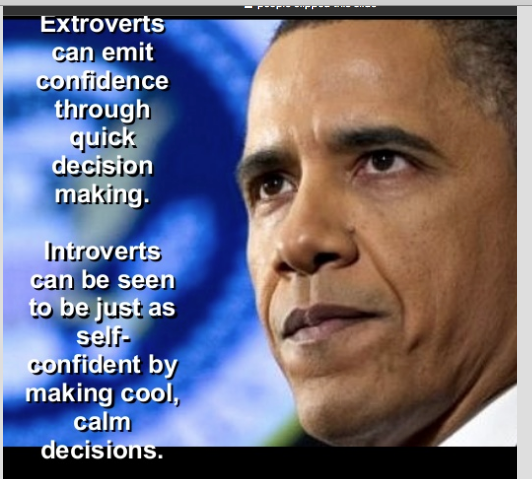
Our culture, particularly in business and politics, seems to be in love with the charismatic, leader who is an extravert (also spelled extrovert) ? the guns blazing, no-holds barred, center-of-attention leader ? who is a super confident if not arrogant, aggressively decisive leader of a band of star-struck followers. This stereotype of a leader appears to be an integral part of our individualistic society, despite the fact that most modern economies and societies have become more collective and workers more educated.
There?s increasing evidence that introverted leaders have a better track record and may be more suited to organizations flourishing in the modern era.
Movies, television and the news media have significantly influenced our popular image of leaders ? from Clint Eastwood, to Jim Carey, Larry Ellison, and Donald Trump ? for the past three decades. This stereotypical view of charismatic, extroverted individuals has been associated with what we want and expect in our leaders.
Extraverted leaders are valued highly regardless of the reality of their performance. The status and reputation of quiet, introverted leadership is undervalued and under-appreciated. Despite decades of research on leadership pointing to other less demonstrative skills that are needed, extroverts are still favored in recruiting and promoting decisions. Recent research reveals that introverted, quiet leaders may be more suited for today?s workplace.
You can argue the case that Wall Street financial scandals and even foreign policy and political problems are linked to the dominance of extraverted leaders. In my 30 + years of work with senior business leaders, I have found most who got into trouble were extreme extraverts who are often also narcissists. Rarely did I encounter a highly respected introverted leader who shared the same fate.
Characteristic Traits of Extraverts (or Extroverts) vs. Introverts
Research by the Center for Application of Psychological Types shows that approximately 50 to 55 percent of American males are introverts. For females, that number is 47 to 55 percent. And yet, as author and psychologist Linda Silverman states, ?The American dream is to be extroverted. We push our children to be ?people who need people.?? And it?s no secret that, if given a choice, most businesses would rather hire people who are outgoing.
Ironically, some of the most successful or admired people, of past and present, are introverts. Examples are: Albert Einstein, Abraham Lincoln, Bill Gates, Warren Buffet, Steven Spielberg, Barack Obama, Meryl Streep, Elon Musk, Gandhi, Michael Jackson, and J.K. Rowling. Studies reported by Jennifer Kahnweiler, author of The Introverted Leader: Building On Your Quiet Strength, show that a full 40 percent of executives are introverts. Chances are many of the people in your business and the majority of your clients may be introverts.
The traits of extraversion (or extroversion) and introversion are a central dimension in some human personality theories. The terms introversion and extraversion were popularized by Carl Jung,although both the popular understanding and psychological usage differ from his original intent. Extraversion tends to be manifested in outgoing, talkative, energetic behavior, whereas introversion is manifested in more reserved and solitary behavior.Rather than focusing on interpersonal behavior, however, Jung defined introversion as an ?attitude-type characterized by orientation in life through subjective psychic contents?, and extraversion as ?an attitude-type characterized by concentration of interest on the external object?.
Scott Barry Kaufman, writing in Scientific American, describes how the most common misunderstanding of the extraversion-introversion dimension is that introverts are more introspective than extroverts. In reality, introverts are not necessarily introspective and highly introspective people aren?t necessarily introverted. In a recent analysis, Kaufman cites, Jennifer Grimes, Jonathan Cheek, and Julie Norem found that measures of Jung?s conceptualization of ?Thinking Introversion? ? introspectiveness, fantasy proneness, and having a rich inner life ? were not significantly correlated with Big Five scales of extraversion-introversion, including a need for positive stimulation and gregariousness.
In fact, Kaufman argues, ?what many people ascribe to introversion really belongs in the intellect/imagination domain. Intellect/imagination represents a drive for cognitive engagement of inner mental experience, and encompasses a wide range of related (but partially separate) traits, including intellectual engagement, intellectual curiosity, intellectual depth, ingenuity, reflection, introspection, imagination, emotional richness, artistic engagement, and aesthetic interests. Contrary to popular conceptualizations of introversion, preferring to be alone is not the main indicator of introversion.?
Researchers have found that the various facets of the introversion-extraversion domain can be boiled down to two related but separate aspects: enthusiasm and assertiveness, Kaufman says:
?Enthusiasm encompasses traits like sociability, friendliness, self-disclosure, gregariousness, and positive emotionality. Enthusiasm is primarily about social affiliation, but goes beyond sociability to include positive emotions, more generally, like joy, exuberance, and excitement. Assertiveness encompasses traits like leadership, dominance, provocativeness, activity, talkativeness, and persuasiveness. Assertiveness is more about social status than social affiliation.?
Extraversion
Extraversion is the state of primarily obtaining gratification from outside oneself. Extraverts tend to enjoy human interactions and to be enthusiastic, talkative, assertive, and gregarious. Extraverts are energized and thrive off being around other people. They take pleasure in activities that involve large social gatherings, such as parties, community activities, public demonstrations, and business or political groups. They also tend to work well in groups. An extraverted person is likely to enjoy time spent with people and find less reward in time spent alone. They tend to be energized when around other people, and they are more prone to boredom when they are by themselves.
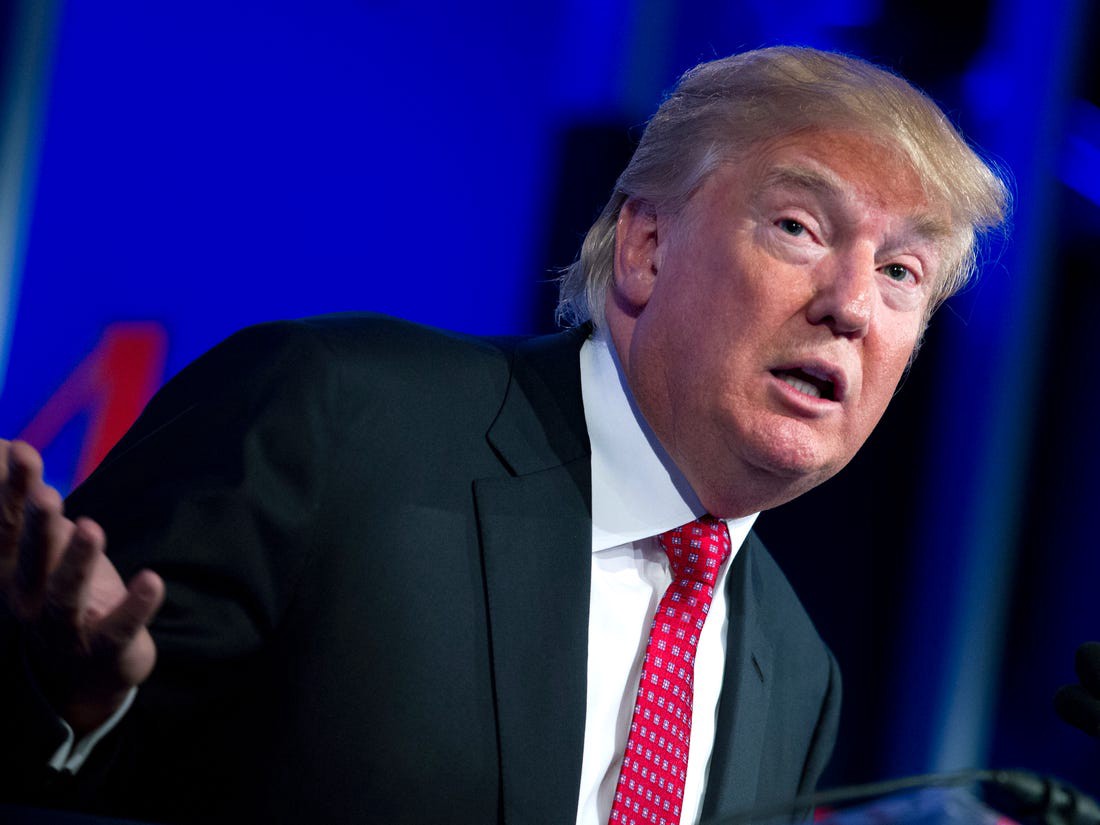
Extroversion clearly has a strong genetic component. Twin studies suggest that genetics contribute somewhere between 40 and 60 percent of the variance between extroversion and introversion.
Environment can also have an impact. Sibling studies have suggested that individual experiences carry greater weight than do shared experiences in families.
In a study published in Psychological Science, researchers found that extraverts tend to be overrepresented in social networks. Because outgoing, popular people tend to have a lot of friends, they are disproportionately represented in social networks. ?If you?re more extraverted, you may really have a skewed view of how extraverted other people are in general,? explained researcher Daniel C. Feiler of Dartmouth University. ?If you?re very introverted you might actually have a pretty accurate idea.?
Extraversion has been correlated with a number of different outcomes. Among the positive outcomes, extraverts tend to spend more time with other people, spend more time engaged in social activities, and tend to have more friends. Research has also suggested that extraverts tend to be happier than introverts as well as being less prone to certain psychological disorders. On the other hand, extraverts are also more likely to engage in risk-taking behaviors, including risky health behaviors.
Introversion
Introversion is the state of being predominantly interested in one?s own mental self. Introverts are typically perceived as more reserved or reflective. Some popular psychologists have characterized introverts as people whose energy tends to expand through reflection and dwindle during interaction. This is similar to Jung?s view, although he focused on mental energy rather than physical energy. Few modern conceptions make this distinction. Introverts often take pleasure in solitary activities such as reading, writing, or meditating. An introvert may enjoy time spent alone and find less reward in time spent with large groups of people. Introverts are easily overwhelmed by too much stimulation from social gatherings and engagement, introversion having even been defined by some in terms of a preference for a quiet, more minimally stimulating external environment. They prefer to concentrate on a single activity at a time and like to observe situations before they participate, especially observed in developing children and adolescents. They are more analytical before speaking.
Author Susan Cain, in her book Quiet: The Power of Introverts in a World That Can?t Stop Talking, defines introversion and extraversion in terms of preferences for different levels of stimulation ? distinguishing it from shyness (fear of social judgment and humiliation).
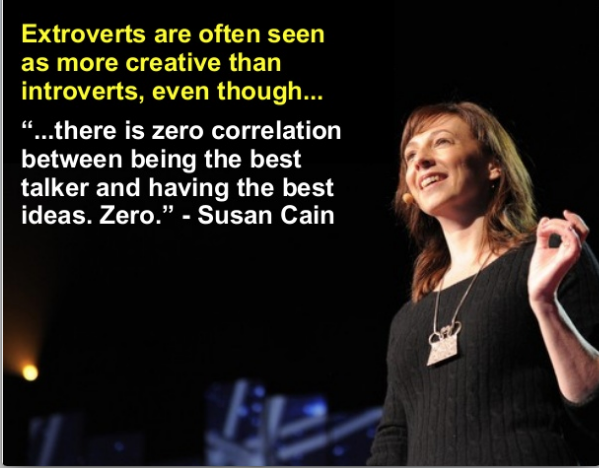
Mistaking introversion for shyness is a common error. Introversion is a preference, while shyness stems from distress. Introverts prefer solitary to social activities, but do not necessarily fear social encounters like shy people do. Cain says Western, particularly American culture is dominated by what she calls the ?Extrovert Ideal?, described as ?the omnipresent belief that the ideal self is gregarious, alpha and comfortable in the spotlight.?
Western societies, being based on the Greco-Roman ideal which praises oratory, favor the man of action over the man of contemplation, and view introversion as being between a disappointment and pathology. In contrast, traditional, pre-Americanized Asian culture is more inclined to value reticence and caution.
Cain argues that modern Western culture misjudges the capabilities of introverted people, leading to a waste of talent, energy, and happiness. Cain describes how society is biased against introverts, and that, with people being taught from childhood that to be sociable is to be happy, introversion is now considered ?somewhere between a disappointment and pathology?. In contrast, Cain says that introversion is not a ?second-class? trait but that both introverts and extraverts enrich society, with examples including the introverts J. K. Rowling, Isaac Newton, Albert Einstein, Mahatma Gandhi, Dr. Seuss, Steven Spielberg, Warren Buffett and Bill Gates.
Concerning the workplace, Quiet critiques today?s perceived overemphasis on collaboration: brainstorming leading to groupthink, and meetings leading to organizational inertia. Cain urges changes to the workplace to make it less focused on what she terms ?The New Groupthink? ? the idea that creativity and productivity emerge from a necessarily gregarious place ? and more conducive to deep thought and solo reflection.
According to Cain, research shows that charismatic leaders earn bigger paychecks but do not have better corporate performance; that brainstorming results in lower quality ideas and the more vocally assertive extroverts are the most likely to be heard; that the amount of space allotted to each employee has shrunk 60% since the 1970s; and that open office plans are associated with reduced concentration and productivity, impaired memory, higher turnover and increased illness. Cain says that the more creative people tend to be ?socially poised introverts?, solitude is a crucial and underrated ingredient for creativity, and office designs and work plans should allow people to be alone as well as to socialize.
What About ?Ambiverts??
So who makes a better employee? It may just be the ambivert (a mix of both introversion and extraversion). As stated above, one?s personality type is not absolute, but rather exists upon a spectrum. According to this article by Elizabeth Bernstein, social psychologists and behavioral scientists now believe that the adaptability of the ambivert may provide some personal and professional advantages.
A 2013 study of ambiverts, published in Psychological Science, looked at 340 call-center employees who answered a personality test to determine their type. Over a three-month period, the best performing employees were ambiverts. Their average revenue per hour was $208, compared with $138 per hour for those employees who were either introverts or extraverts.
What is an ambivert? An ambivert is someone who exhibits qualities of both introversion and extraversion and can flip into either depending on their mood, context and goals.
Ambiverts have also been called:
Outgoing introverts: An introvert who can be outgoing in certain situations or around certain people ? or when they absolutely need to.
Antisocial extraverts: An extrovert who needs time to recharge before socializing or likes to be alone more than a typical extrovert.
Social introverts: An introvert who can dial up into extroversion when needed.
Our Preference for Extraverted Leaders
In western society, extroversion is celebrated. The outgoing and enthusiastic nature of a person who gets things done and is a great communicator is considered an asset. Much of our public life is dominated by extroverts. In fact we?re living in an ?extrovert ideal?, in a University of North Carolina study, it was found that 96% of managers and executives display extroverted characteristics.
Extraverted individuals have been shown to perform good results in an extraverted culture such as sales, entertainment and politics. According to The Owner?s Manual for Personality at Work, by P.Howard, and J. Howard, many extravert managers are comfortable leading by wandering around, enjoy being in the thick of things, handle a heavy meeting schedule well, enjoy meeting and greeting, and are likely to have an extensive network of contact inside and outside the organization.
What the Research Tells Us
Recent research by Francesca Gino of Harvard University and David Hoffman of the University of North Carolina, published in the Academy of Management Journal, shows a significant correlation between the types of leadership style needed and the personalities and behavior of employees.
They argue that extraverted leadership commands attention: Being assertive, bold, talkative and dominant, providing a clear authority, structure and direction. However, pairing extraverted leaders with employees who take the initiative, are more independent and speak out can lead to conflict, while pairing the same type of employees with an introverted leader can be more successful. The study also showed when employees are more proactive, introverted managers lead them to higher profits, whereas where employees are not proactive, extraverted managers are more successful. They concluded that introverted and extraverted leadership styles can be equally effective, but with different kinds of employees.
The researchers reported that whereas just 50% of the general population is extraverted, 96% of managers and executives display such personalities. And the higher you go in a corporate hierarchy, the more likely you are to find highly extraverted individuals. Yet, ?introverts are more receptive to people since they tend to listen more than extroverts,? Gino says. ?The fact they are more receptive is due primarily to their ability and willingness to listen carefully to what others have to say without being threatened.?
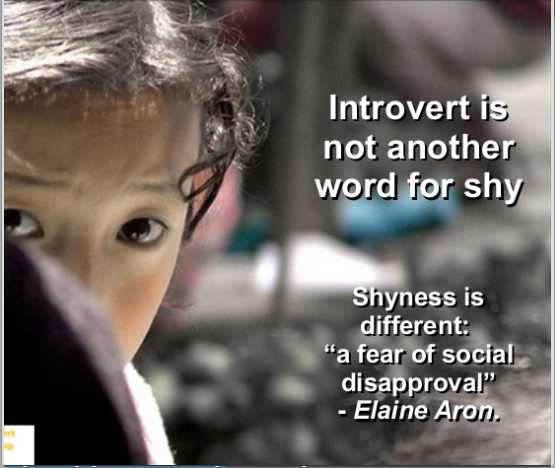
Frances B. Kahnweiler, author of The Introverted Leader: Building on Your Quiet Strength, offers five key characteristics of introverted leaders:
They think first and talk later. They consider what others have to say, then reflect and respond.
They focus on depth not superficiality. They like to dig deeply into issues and ideas before considering new ones.
They exude calm. In times of crisis in particular, they project reassuring, unflappable confidence.
They prefer writing to talking. They are more comfortable with the written word, which helps them formulate the spoken word.
They embrace solitude. They are energized by spending time alone, and often suffer from people exhaustion. They need a retreat, from which they emerge with renewed energy and clarity.
Harvard Business Review research has shown that introverts are more effective leaders in complex and unpredictable settings. In fact, introverts are uniquely suited to navigate situations that extraverts can?t, and that quiet leadership is often critical to a company?s long-term success.
A study published in the International Journal of Multidisciplinary Research and Development recently explained why introverts make such good leaders:
Introverts think before they speak. Extraverts tend to shoot from the hip, often with a ?ready-fire-aim? attitude. Introverts are more likely to think things over, consider how their words will affect others, and only then speak out.
Introverts are better listeners. Where an extravert will simply ignore a dissenting view and then make a ?gut decision,? an introvert tends to carefully consider the comments and perspectives of others before making an important decision.
Introverts are deeper thinkers. Extraverts tend to jump from subject to subject to get ?big picture.? Introverts prefer to delve into issues before making decisions and moving on to other subjects.
Introverts prefer writing to talking. While many introverts are inspirational public speakers, they believe that writing a coherent document forces the brain to hone and clarify its ideas.
Introverts are calmer in a crisis. As the analysis put it, introverts ?project a reassuring, calm confidence. They tend to speak softly and slowly regardless of the heat of the conversation or circumstances.?
Introverts have a management style that?s sometimes called ?servant leadership,? which according to The Journal of Management is ?demonstrated by empowering and developing people; by expressing humility, authenticity, interpersonal acceptance, and stewardship; and by providing direction.?
Research studies how shown where introverts tend to outperform extraverts as leaders. One study reported that introverts are more effective leaders of proactive teams than extroverts. These leaders are individuals who foster good performance in others by focusing on the growth and well-being of their teams.
Clinical psychologist Laurie Helgoe states in Introvert Power: Why Your Inner Life Is Your Hidden Strength, introverts have an ?internal power ? the power to birth fully formed ideas, insights, and solutions ? An introvert who sits back in a meeting, taking in the arguments, dreamily reflecting on the big picture, may be seen as not contributing ? that is, until he works out the solution that all the contributors missed.?
Beth Buelow, author of Insight: Reflections on the Gifts of Being an Introvert, describes introverted employees this way: ?The introvert?s even temper creates a peaceful atmosphere that engenders trust and safety for those around them. Trust, in turn, helps us do business more effectively. Staying stable and calm in all situations ? cultivating equanimity and composure ? are the hallmarks of introverts. These attitudes can radiate to others in the workplace, and especially to customers. We can all sense when we enter a business if employees are on edge, which has a detrimental effect on our customer relation experience. If the operative word is calm, the introverts among us can teach us a thing or two.?
A study by researchers at the University of Chicago, and Harvard and Stanford Universities, concluded that introverted chief executives make better leaders. The researchers analyzed 4000 CEOs of publicly traded US companies into five broad personality traits, known by psychologists as The Big Five: Agreeableness, conscientiousness, extraversion (versus introversion), neuroticism (versus emotional stability), and openness to experience. The results of the study showed introverted CEOs outperformed companies ran by extraverts. Steven Kaplan, a co-author of the study, explained one of the main reasons for this finding shares is that when companies are in trouble, they often seek out a big personality.
A 10-year study, called the CEO Genome Project, from a leadership advisory firm ghSmart and economists from two business schools, published in the Harvard Business Review, finds that the most successful chief executives often don?t fit the traditional stereotype. The researchers behind the study, used a database of assessments ? comprehensive performance appraisals and extensive biographical information ? of 17,000 C-suite executives, including 2,000 CEOs. The database includes everything from career history to behavioral patterns to how the executives performed in past jobs, decisions they?ve made and demographic information.Their analysis examined a sample of 930 of those CEOs to describe the traits and patterns that most predicted which ones became a CEO. They also gathered information on the performance of 212 of them to compare how top-performers? behaviors lined up with the traits that tend to get CEOs hired.
The results of the study surprised the researchers. More than half of the CEOs who did better than expected in the minds of investors and directors were actually introverts, not the usual gregarious CEOs extraverts.
?The biggest aha, overall, is that some of the things that make CEOs attractive to the board have no bearing on their performance,? said Elena Lytkina Botelho, a partner at ghSmart and a co-founder of the project. ?Like most human beings, they get seduced by charismatic, polished presenters. They simply do better in interviews.? Botelho says she doesn?t necessarily think introverts are always better performers, but that they may be more prevalent, and do better in her sample, because boards are so attracted to them. ?I?ve been in the room and had directors express the concern ? ?this person is such a strong introvert, how will they really lead?? ? she said. Similarly, candidates who displayed a lot of confidence had more than double the chance of being chosen as CEO, the study found, even though particularly confident CEOs were no more likely to show better performance once they got the job.
Other research shows that introverted leaders also exhibit these strengths.
They are prudent. Unlike their extraverted counterparts who are more sensitive to rewards, which explains why extroverts are more pre-disposed to risk-taking, introverts take a circumspect approach to chance. This is why you hear extraverts say things such as, ?Let?s just do it!? whereas introverts prefer to ask, ?are we sure this is the right thing to do??
They learn by listening. Rather than unproductive conversations that can often define meetings, introverts listen intently to what others say and internalize it before they speak. They?re not thinking about what to say while the other person is still taking.

They leverage their quiet nature. They wait until most or all of the conversation is done, and then speak. Often the result is impactful on others. They ?own? the moment by speaking calmly and deliberately.
They demonstrate humility. Of course extraverts can be humble too, but introverts tend to have a more accurate sense of their abilities and achievments and don?t overestimate them. Humility entails the ability to acknowledge mistakes, imperfections, knowledge gaps and limitations, all of which are important in business and life. Also, being humble indicates an open-mindedness to new ideas or not overreact to contradictory information.
They manage uncertainty. Since introverts have a lower sensitivity to external rewards than extraverts, they are more comfortable working with little informaiton and resisting self-defeating impulses. Introverts are also more likely to persists in finding solutions that aren?t initially apparent.
Conclusion:
When are we going to stop favoring, idolizing and promoting extraverted leaders, needing them to be bigger than life in a way reminiscent of celebrities and movie stars, and start appreciating the value of introverted, quiet, humble leaders, and accept the research evidence that the change will serve us better?
